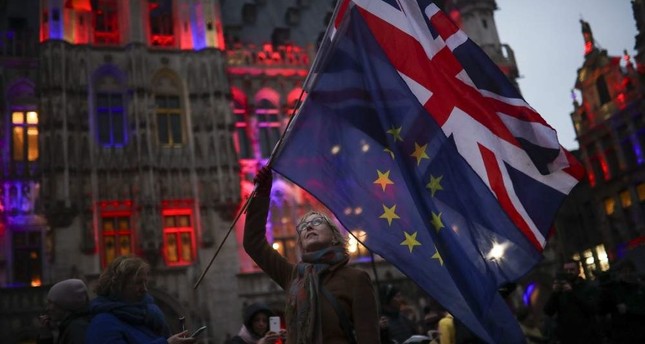
Brexit finally happens: UK officially ends 47-year EU membership
by DAILY SABAH WITH AGENCIESFollowing more than three years of political divisiveness fueled by a long stint of uncertainty, two general elections and countless furious protests in the U.K., Brexit has finally happened.
The European Union has now experienced one of its members leaving the bloc Friday for the first time in its history, marking the end of the U.K.’s 47-year membership. However, the latter’s exit is currently merely symbolic, as things will not start to change drastically until the end of the 11-month transition period.
It can be argued that the country is not done with Brexit, but that it has moved on to a new chapter in the saga.
Jonathan Portes, professor of economics and public policy at King's College London, thinks that "the vast majority of individuals and businesses won’t notice anything," and that "nothing, in reality, will change."
EU nationals and Britons will keep on benefiting from free movement and will continue living in their countries under the pre-Brexit rules and regulations for the time being.
Topping the U.K. government’s priority list is the arrangement of a trade deal for future commercial relations with Europe. The biggest challenge from now on will be to achieve this in the span of just 11 months, a deadline Prime Minister Boris Johnson has insisted upon.
Ruling out alignment with European regulations, the prime minister is pushing for a similar arrangement that the EU has with Canada. The EU-Canada Comprehensive Economic and Trade Agreement (CETA) removes 98% of tariffs on traded goods while still keeping some restrictions. The latter was less ambitious than the current U.K.-EU pact and still took seven years to finish. The biggest worry now is the possibility of a no-compromise situation at the end of the transition period, which would result in quotas, regulatory barriers and tariffs, all of them seen as detrimental to the economic relationship between the two sides.
Another reason why Brexit won’t have an immediate impact is due to the fact that the current laws governed by Brussels and imposed on London will take some time to be repatriated. The U.K. will keep obeying EU laws, at least during the transition period.
The highly controversial Irish border will remain open during that period. Both sides will negotiate the Northern Ireland Protocol, an arrangement looking to prevent a hard border on the Irish island. The talks are expected to be complicated as they will look to keep Northern Ireland in the U.K.’s customs territory, but only by applying EU rules on manufactured and agricultural goods at the same time.
The need for customs on the island will cease to exist as a result, a proposition that is considered to be dangerous given Ireland’s violent sectarian history.
Nevertheless, the historical importance of Jan. 31 should not be overlooked, as it marks a first in the European Union’s history and will change its perception worldwide while simultaneously opening a new chapter for the U.K., freeing them of the uncertainty that has gripped the region for over three years.
But all signs point to the creation of new uncertainties that are currently replacing the old ones, especially in the aftermath of the 11-month transition period. Some in the country are celebrating Brexit, while others are more pessimistic about the future.
Johnson will have to accomplish a lot in a very short time if he wants his country to leave the bloc with minimal damage by the end of the year. He has made sure that they will leave but faces a crucial challenge that will change his country’s future forever, and every small sign of progress leading to the 11-month deadline wields essential weight.